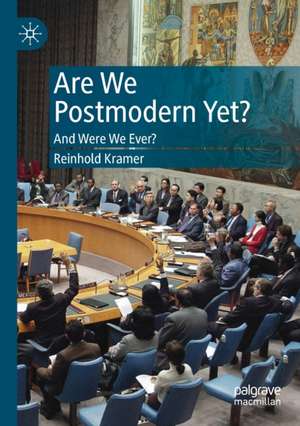Are We Postmodern Yet?: And Were We Ever?
Autor Reinhold Krameren Limba Engleză Paperback – 19 noi 2020
In this book, Reinhold Kramer explores a variety of important social changes, including the resistance to objective measures of truth, the rise of “How-I-Feel” ethics, the ascendancy of individualism, the immersion in cyber-simulations, the push toward globalization and multilateralism, and the decline of political and religious faiths. He argues that the displacement, since the 1990s, of grand narratives by ego-based narratives and small narratives has proven inadequate, and that selective adherence, pluralist adaptation, and humanism are more worthy replacements. Relying on evolutionary psychology as much as on Charles Taylor, Kramer argues that no single answer is possible to the book title’s question, but that the term “postmodernity” – referring to the era, not to postmodernism – still usefully describes major currents within the contemporary world.
| Toate formatele și edițiile | Preț | Express |
|---|---|---|
| Paperback (1) | 454.37 lei 6-8 săpt. | |
| Springer International Publishing – 19 noi 2020 | 454.37 lei 6-8 săpt. | |
| Hardback (1) | 532.70 lei 6-8 săpt. | |
| Springer International Publishing – 19 noi 2019 | 532.70 lei 6-8 săpt. |
Preț: 454.37 lei
Nou
Puncte Express: 682
Preț estimativ în valută:
86.97€ • 94.50$ • 73.10£
86.97€ • 94.50$ • 73.10£
Carte tipărită la comandă
Livrare economică 21 aprilie-05 mai
Preluare comenzi: 021 569.72.76
Specificații
ISBN-13: 9783030305710
ISBN-10: 3030305716
Pagini: 328
Ilustrații: XIII, 328 p.
Dimensiuni: 148 x 210 mm
Greutate: 0.41 kg
Ediția:1st ed. 2019
Editura: Springer International Publishing
Colecția Palgrave Macmillan
Locul publicării:Cham, Switzerland
ISBN-10: 3030305716
Pagini: 328
Ilustrații: XIII, 328 p.
Dimensiuni: 148 x 210 mm
Greutate: 0.41 kg
Ediția:1st ed. 2019
Editura: Springer International Publishing
Colecția Palgrave Macmillan
Locul publicării:Cham, Switzerland
Cuprins
Chapter 1: Introduction: The Contemporary Era.- Chapter 2: Truth or Truths?.- Chapter 3 Ethics: “How I feel at the time”.- Chapter 4: Individualism: “I Believe in Me”.- Chapter 5: Adventures in Cyber-culture.- Chapter 6 :The Nation.- Chapter 7 :Faith and Other Grand Narratives.- Chapter 8: Conclusion.
Recenzii
“This impressively wide-ranging book suggests that there is an important distinction between postmodernism (the theories) and postmodernity (the practices) – between ‘literary and philosophical skepticism about foundations and reality’ and ‘post-war social developments.’ … the book has plenty of range, and this is one of the great pleasures of reading it.” (Karl Manis, University of Toronto Quarterly, Vol. 91 (3), August, 2022)
Notă biografică
Reinhold Kramer is a professor at Brandon University in Canada. He is the author of Scatology and Civility in the English-Canadian Novel and Mordecai Richler: Leaving St. Urbain (winner of a Jewish Book Award and the Gabrielle Roy Prize).
Textul de pe ultima copertă
In this book, Reinhold Kramer explores a variety of important social changes, including the resistance to objective measures of truth, the rise of “How-I-Feel” ethics, the ascendancy of individualism, the immersion in cyber-simulations, the push toward globalization and multilateralism, and the decline of political and religious faiths. He argues that the displacement, since the 1990s, of grand narratives by ego-based narratives and small narratives has proven inadequate, and that selective adherence, pluralist adaptation, and humanism are more worthy replacements. Relying on evolutionary psychology as much as on Charles Taylor, Kramer argues that no single answer is possible to the book title’s question, but that the term “postmodernity”—referring to the era, not to postmodernism— still usefully describes major currents within the contemporary world.
Caracteristici
Argues that postmodernity is still useful, particularly in the area of ethics, to systematically distinguish the contemporary world from earlier eras Uses balanced language to describe of changes that modernity has undergone in the late 20th and early 21st centuries Combines diverse subject areas to give readers a broad overview
